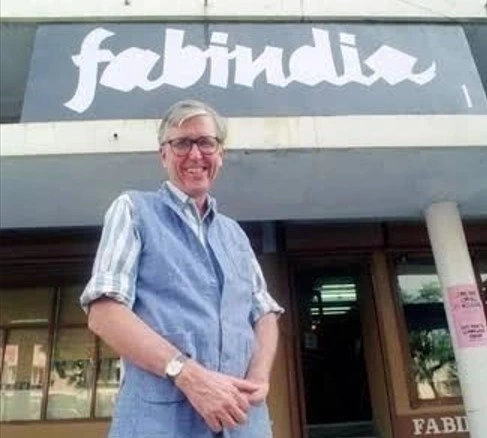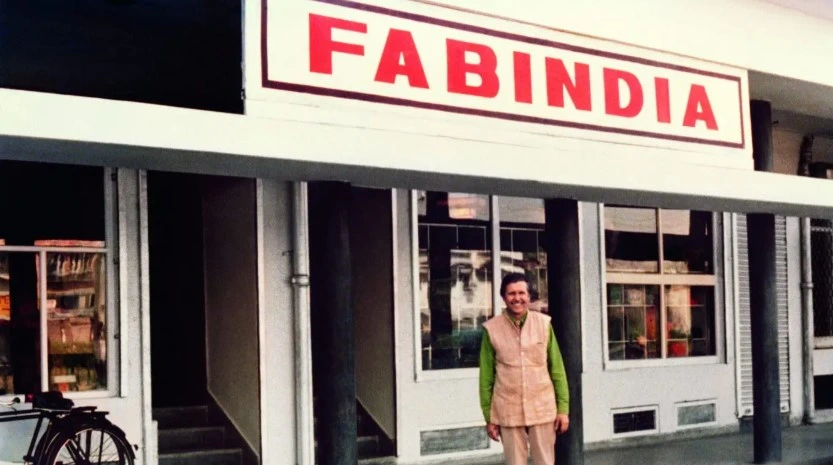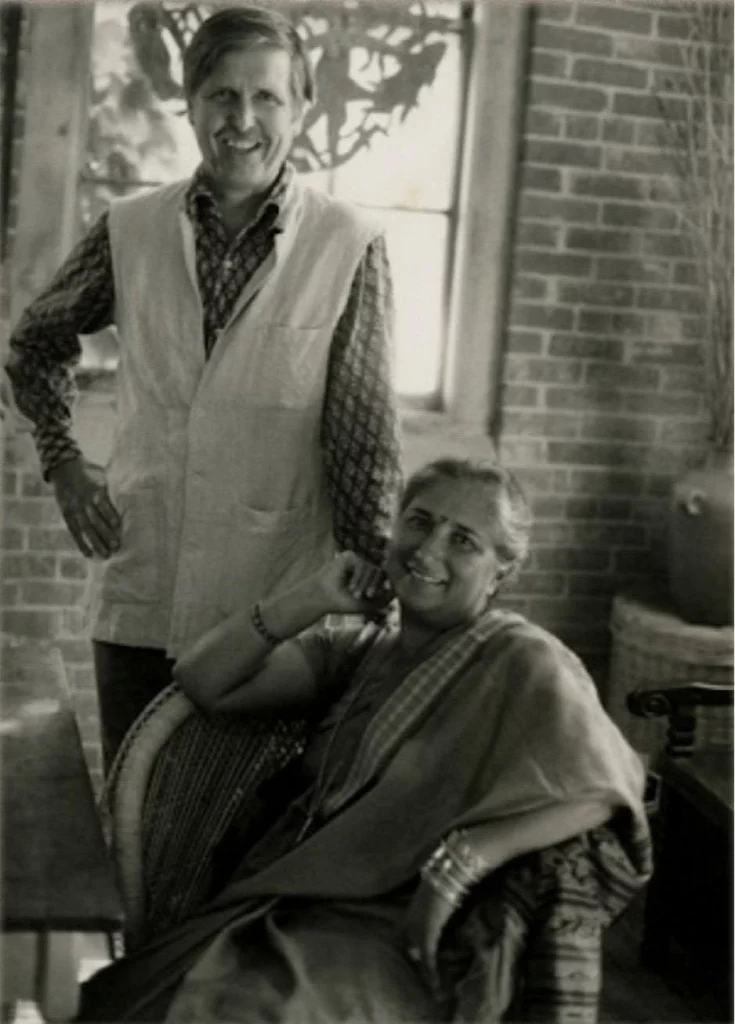(April 2, 2025) When John Latane Bissell first arrived in India in 1958, he likely did not foresee the extraordinary journey that lay ahead. A Connecticut-born American with deep New England roots, Bissell would go on to found Fabindia, one of India’s most beloved lifestyle brands. Yet his legacy runs far deeper than business success. Through empathy, cultural respect, and enduring commitment, Bissell became a quiet revolutionary, an outsider who helped shape the future of Indian artisanal crafts while weaving himself into the country’s cultural fabric.
JLB: A name, a legacy
John Latane Bissell, fondly remembered by his initials, JLB, was more than a businessman. He was a bridge between continents and cultures. Today, his initials live on through JLB Partners Holding, Inc., co-owned by his children William and Monsoon Bissell, and through the continued spirit of Fabindia, the company he founded in 1960.
Born in 1930 in Hartford, Connecticut, Bissell came from an old New England family. His ties to India, surprisingly, ran deep. “Traces of India running through three generations”, as he would describe it. But it wasn’t until the late 1950s that his Indian story truly began.

John Bissel
An assignment that changed everything
John Bissell was educated at the Brooks School in North Andover, Massachusetts, and later at Yale University. His fascination with India took root early, nurtured by childhood stories from his father, who had spent time in the country during World War II.
After graduating, Bissell began his career at the American department store chain Macy’s in New York, where he developed a growing appreciation for the texture and artistry of handwoven fabrics. These two interests—his love for India and his passion for textiles would come together in a life-defining way in 1958, when he received a two-year grant from the Ford Foundation. His assignment was to work with rural artisans in India and help them create export-ready products.
Over the next two years, Bissell crisscrossed India’s rural heartlands, meeting weavers, block printers, dyers, and embroidery artists whose skills were astonishing but whose livelihoods were precarious. What was meant to be a short-term development assignment became a deeply personal transformation. He saw not just beauty in the craftsmanship but also a glaring market gap, one that he became determined to bridge.
So, when the grant ended, Bissell chose not to return home. Instead, he stayed on in India, laying the foundation for Fabindia Ltd in 1960.
The foundation of Fabindia
In 1960, Bissell returned briefly to the United States to raise capital. He secured funding, notably a $20,000 inheritance from his grandmother, and soon returned to Delhi to start the export company. He named it Fabindia, Inc., a tribute to the fabrics of India he had grown to revere.
The company was launched from two rooms adjoining his bedroom in Delhi’s upscale Golf Links neighborhood. Fabindia’s early business focused solely on exports. The company began by sourcing locally made goods such as dhurrie rugs and exporting them to global markets.
By 1965, the fledgling company had already crossed a turnover of ₹ 20 lakhs, confirming what Bissell instinctively knew that the world was ready for India’s handmade heritage, if only someone would bring it to them with integrity and style.
”The greatest thing that happened to our business was the move in Europe and America a few years back to the natural look, natural textures, natural fibers, and away from things like polyester and nylon,” he said in a 1977 interview.

John Bissel in front of a New Delhi store, many years back
A man of warmth and vision
John Bissell was known not only for his vision but for the warmth and authenticity with which he carried it out. Those who met him recalled his open personality, his easy smile, his informality, and his adaptability. Whether seated with bureaucrats in Delhi or artisans in Gujarat, Bissell treated everyone with the same respect.
He was, above all, highly dedicated to craftspeople. He didn’t believe in charity, rather believed in market access. As his son William Bissell later said, “Fabindia was founded out of the passion my father had for the incredible craft traditions of India. He believed they needed a market so that the producers could make a decent living practicing their craft. Over sixty years later, Fabindia is doing the same thing.”
Building a culture, not just a company
The 1970s brought new challenges. The Emergency in India (1975–76) and evolving commercial regulations forced Fabindia to shift from residential operations to formal retail. Rising to the moment, Bissell opened the first Fabindia retail store in Greater Kailash, New Delhi, in 1976. It was a turning point that transformed the brand from export house to household name.
Bissell also responded to tightening foreign equity laws in India by inviting artisans, suppliers, and Indian family members to become shareholders. In doing so, he sowed the seeds of a collective ownership model, one that would be further developed in future years.
In addition to making profits, our aims are constant development of new products, a fair, equitable and helpful relationship with our producers, and the maintenance of quality on which our reputation rests.
John Bissell
Throughout, Fabindia has remained anchored to his values of quality, dignity, and equity.
Tradition meets contemporary taste
One of Bissell’s genius insights was the potential to blend traditional techniques with contemporary design. Fabindia, under his direction, worked with designers to create modern versions of Indian classics like churidars, kurtas, handwoven shawls, tailored to the evolving sensibilities of India’s urban middle class. Fabindia’s look has always been earthy yet elegant, timeless yet trendy. In doing so, it redefined not only retail but also how a generation dressed and decorated their homes.
His partnership with British designer Terence Conran, whose Habitat stores featured Fabindia products in the 1980s, gave Indian craft a prestigious European stage, expanding Fabindia’s reach and reinforcing its quality credentials.
Love, family, and a life fully lived
Bissell’s life in India wasn’t just professional. It was deeply personal. He married Bimla Nanda, whose cultural grounding and gentle strength proved instrumental in shaping Fabindia’s authentic ethos. Bimla Nanda, also served as social secretary for Chester A. Bowles and John Kenneth Galbraith when they were United States Ambassadors to India.
The couple raised their two children, William and Monsoon, in a home that fused American sensibilities with Indian values.
John Bissell became an Indian in spirit long before he was one on paper. He never returned to the U.S. to live and was eventually laid to rest in the country he had come to love as his own.

John and Bimla Bissel
A legacy carried forward
In 1993, after Bissell suffered a debilitating stroke, leadership of Fabindia passed to his son William. It was a challenging time. The company had also just lost its biggest international client, Habitat, but William was ready.
Educated in philosophy and political science at Wesleyan University, and armed with deep grassroots experiences in rural Rajasthan, William expanded Fabindia’s footprint dramatically. He diversified into organic foods, personal care, home furnishings, and handcrafted jewelry, while retaining the brand’s core values.
Today Fabindia links more than 5,000 craft based rural producers to a network of over 350+ retail stores across India and in select international locations in the US and Europe, preserving India’s traditional handicrafts while creating a base for skilled, sustainable rural employment, in the process.
Giving back
Beyond business, the Bissells created The Fabindia School in Bali, Rajasthan in 1992, a philanthropic venture offering affordable, quality education in rural India. It remains a shining example of John and William’s shared belief in empowerment through opportunity.
Stitching together a movement
John Bissel died at the age of 66 in 1998. The American founder of Fabindia was a rare soul who helped a nation rediscover the power and pride of its own handmade traditions. Today, as Fabindia celebrates 65 years, it remains deeply faithful to John Bissell’s founding principles – heritage, sustainability, and dignity for artisans. His influence endures not just in store layouts or business models but in the very ethos of conscious consumption in India.
John Bissell didn’t just start a company. He started a movement, a new model of retail built on respect for tradition and compassion for community. He saw India’s crafts not as fading relics, but as living, breathing expressions of identity.
ALSO READ: Simone Tata: The Geneva tourist who stayed on and shaped Lakmé’s destiny




